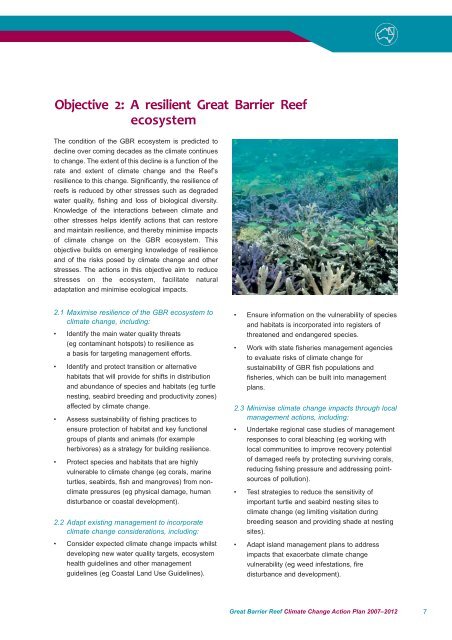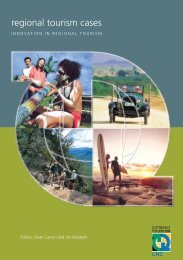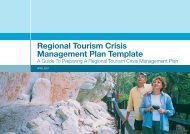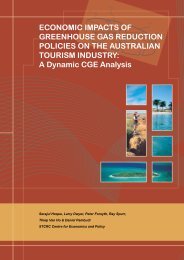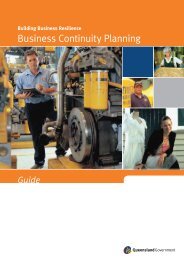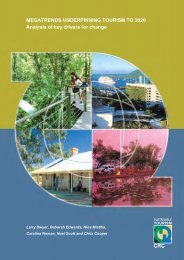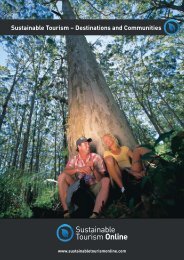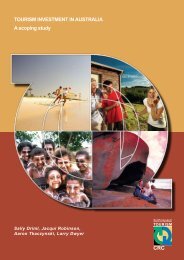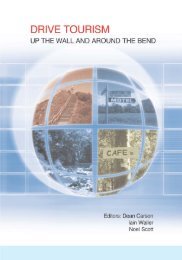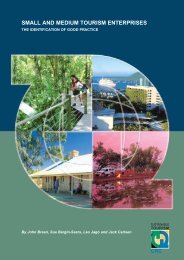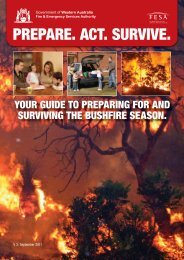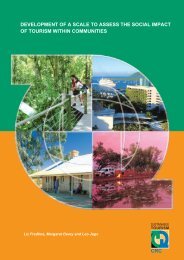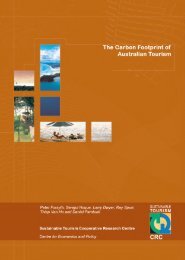Climate Change Action Plan - Great Barrier Reef Marine Park Authority
Climate Change Action Plan - Great Barrier Reef Marine Park Authority
Climate Change Action Plan - Great Barrier Reef Marine Park Authority
Create successful ePaper yourself
Turn your PDF publications into a flip-book with our unique Google optimized e-Paper software.
Objective 2: A resilient <strong>Great</strong> <strong>Barrier</strong> <strong>Reef</strong><br />
ecosystem<br />
The condition of the GBR ecosystem is predicted to<br />
decline over coming decades as the climate continues<br />
to change. The extent of this decline is a function of the<br />
rate and extent of climate change and the <strong>Reef</strong>’s<br />
resilience to this change. Significantly, the resilience of<br />
reefs is reduced by other stresses such as degraded<br />
water quality, fishing and loss of biological diversity.<br />
Knowledge of the interactions between climate and<br />
other stresses helps identify actions that can restore<br />
and maintain resilience, and thereby minimise impacts<br />
of climate change on the GBR ecosystem. This<br />
objective builds on emerging knowledge of resilience<br />
and of the risks posed by climate change and other<br />
stresses. The actions in this objective aim to reduce<br />
stresses on the ecosystem, facilitate natural<br />
adaptation and minimise ecological impacts.<br />
2.1 Maximise resilience of the GBR ecosystem to<br />
climate change, including:<br />
• Identify the main water quality threats<br />
(eg contaminant hotspots) to resilience as<br />
a basis for targeting management efforts.<br />
• Identify and protect transition or alternative<br />
habitats that will provide for shifts in distribution<br />
and abundance of species and habitats (eg turtle<br />
nesting, seabird breeding and productivity zones)<br />
affected by climate change.<br />
• Assess sustainability of fishing practices to<br />
ensure protection of habitat and key functional<br />
groups of plants and animals (for example<br />
herbivores) as a strategy for building resilience.<br />
• Protect species and habitats that are highly<br />
vulnerable to climate change (eg corals, marine<br />
turtles, seabirds, fish and mangroves) from nonclimate<br />
pressures (eg physical damage, human<br />
disturbance or coastal development).<br />
2.2 Adapt existing management to incorporate<br />
climate change considerations, including:<br />
• Consider expected climate change impacts whilst<br />
developing new water quality targets, ecosystem<br />
health guidelines and other management<br />
guidelines (eg Coastal Land Use Guidelines).<br />
• Ensure information on the vulnerability of species<br />
and habitats is incorporated into registers of<br />
threatened and endangered species.<br />
• Work with state fisheries management agencies<br />
to evaluate risks of climate change for<br />
sustainability of GBR fish populations and<br />
fisheries, which can be built into management<br />
plans.<br />
2.3 Minimise climate change impacts through local<br />
management actions, including:<br />
• Undertake regional case studies of management<br />
responses to coral bleaching (eg working with<br />
local communities to improve recovery potential<br />
of damaged reefs by protecting surviving corals,<br />
reducing fishing pressure and addressing pointsources<br />
of pollution).<br />
• Test strategies to reduce the sensitivity of<br />
important turtle and seabird nesting sites to<br />
climate change (eg limiting visitation during<br />
breeding season and providing shade at nesting<br />
sites).<br />
• Adapt island management plans to address<br />
impacts that exacerbate climate change<br />
vulnerability (eg weed infestations, fire<br />
disturbance and development).<br />
<strong>Great</strong> <strong>Barrier</strong> <strong>Reef</strong> <strong>Climate</strong> <strong>Change</strong> <strong>Action</strong> <strong>Plan</strong> 2007–2012<br />
7


